Ata-ul-Haye Nasir, Al Hakam

In 2020, 2021 and 2022, Al Hakam published articles about the inception and early years of the Waqf-e-Jadid scheme, which covered the time of Hazrat Khalifatul Masih IIra, Hazrat Khalifatul Masih IIIrh, and Hazrat Khalifatul Masih IVrh. Continuing the series, this article will present the history of Waqf-e-Jadid during the first 20 years of the blessed era of Hazrat Khalifatul Masih Vaa.
In 1957, Hazrat Musleh-e-Maudra launched the scheme of Waqf-e-Jadid for the religious education and tarbiyat of Ahmadis in the rural areas of Pakistan and preaching the message of Islam to the Hindus residing in the Sindh province of Pakistan.
During his Friday Sermon on 9 January 2004, Hazrat Mirza Masroor Ahmad, Khalifatul Masih Vaa, said:
“This scheme, initiated by Hazrat Musleh-e-Maudra in 1957, was predominantly connected to the jamaats of Pakistan and, to some extent, to India. In 1985, Hazrat Khalifatul Masih IVrh expanded it to the whole world, and the outside Jamaats also began to participate in this scheme with great passion and offered sacrifices.” (Khutbat-e-Masroor, Vol. 2, p. 24)
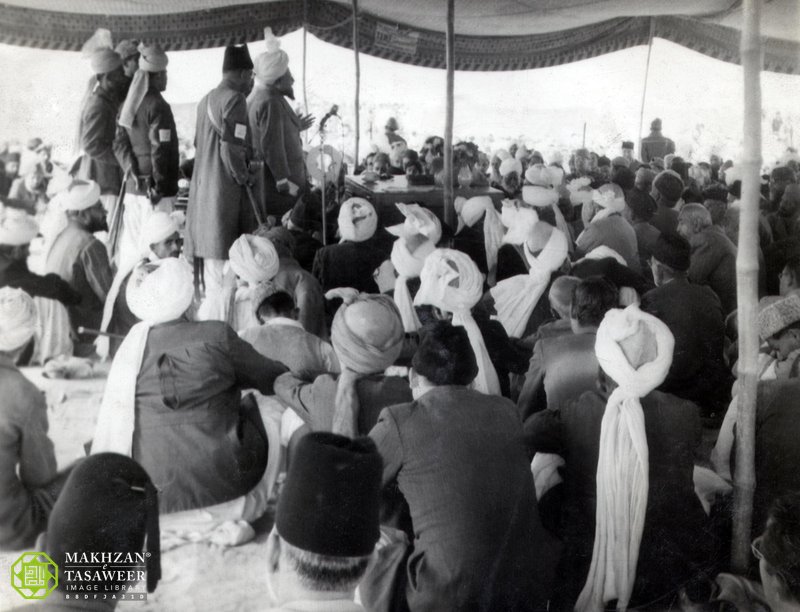
In regards to the nau mubai‘een (new converts), Huzooraa said:
“From the very beginning, the nau mubai‘een [new converts] should be told that if they do not or cannot pay the Chanda-e-Aam [obligatory chanda for an Ahmadi] at its fixed rate, then they ought to offer chanda in any of the schemes, for instance, in Waqf-e-Jadid or Tahrik-e-Jadid, which will gradually instil a habit within them. As a result, they will begin to contribute to the financial sacrifices with love and eagerness.” (Ibid., p. 35)
Mentioning the progress of Waqf-e-Jadid during the year 2003, Huzooraa said, “According to the figures of the previous year, the total collection for Waqf-e-Jadid is £1,880,000, which is an increase of £370,000 as compared to the previous year’s collection. Alhamdulillah.” (Ibid., p. 38)
Advising the Ahmadi mothers, during his Friday Sermon on 7 January 2005, Hazrat Khalifatul Masih Vaa said:
“Ahmadi mothers are required to train their children to participate in Waqf-e-Jadid, in order to inculcate in them the habit of paying chanda. In Pakistan, Hazrat Khalifatul Masih IIIrh had given the responsibility of Waqf-e-Jadid to the children, and since that time, children there have been paying this chanda with great passion. If other countries in the world also call the attention of Atfal-ul-Ahmadiyya and Nasirat-ul-Ahmadiyya towards this, it will not only increase the number of participants but the amount of chanda as well. Moreover, the main objective — that is, to instil a passion for sacrifice — will be achieved as well. Insha-Allah.” (Khutbat-e-Masroor, Vol. 3, p. 9)
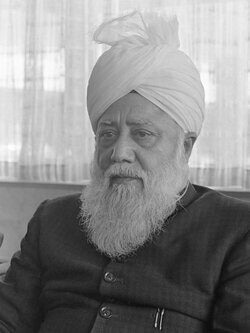
During his Friday Sermon on 6 January 2006, Huzooraa said:
“This chanda of Waqf-e-Jadid has no such condition that one must pay a certain amount. A very poor person can also participate in it according to their capacity. When one offers financial sacrifice, they become the recipient of prayers. They would become the recipients of the angels’ prayers and the pleasure of God Almighty as well. Allah the Almighty will improve their condition due to this sacrifice, according to His promise. Thus, every Ahmadi ought to understand the importance of financial sacrifice. Nau mubai‘een should also be included in this. […]
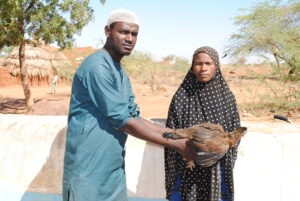
“Hazrat Musleh-e-Maudra, the founder of the scheme of Waqf-e-Jadid, once said:
“‘I am hopeful that as much as the scheme of Waqf-e-Jadid will strengthen, the chandas of Sadr Anjuman Ahmadiyya and Tahrik-e-Jadid will also increase proportionally, by the grace of Allah the Almighty.’ (Paigham, 3 January 1962)” (Khutbat-e-Masroor, Vol. 4, pp. 8-9)
Addressing the mu‘allimeen and missionaries, Huzooraa said:
“While the members are offering financial sacrifices, the mu‘allimeen and missionaries are required to utilise their capabilities to their capacity. […] In this era, we should have a missionary and mu‘allim in every village, town, and city, as well as in the mosques that are situated there. For this, anyway, the Jamaat will have to make financial sacrifices. Only then we could provide [the required number of missionaries and mu‘allimeen]. Moreover, the members of the Jamaat will have to offer sacrifices themselves and to make sacrifices by dedicating their children to this task.” (Ibid., p. 14)
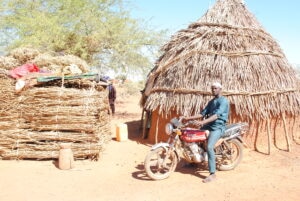
Mentioning the progress of Waqf-e-Jadid during the year 2005, Huzooraa said:
“According to the reports received, the total collection for Waqf-e-Jadid, by the grace of Allah the Almighty, is £2,142,000, which is an increase of £200,000 as compared to the previous year’s collection. Alhamdulillah.” (Ibid., pp. 14-15)
Huzooraa prayed:
“May Allah the Almighty grant greater results during this [new] year, may the Jamaat’s level of financial sacrifices exceed, and may the waqifeen-e-zindagi [life-devotees], missionaries, and mu‘allimeen enhance in their level of taqwa and relation with Allah the Almighty. Moreover, may each member of the Jamaat realise their importance and responsibilities, and may every one of us attain the love of Allah the Almighty by bringing about pious changes among ourselves, and continue striving for this objective. May Allah enable everyone to do so. [Amin]” (Ibid., pp. 15-16)
Narrating about the early history of Waqf-e-Jadid, during his Friday Sermon on 12 January 2007, Huzooraa said:
“As we all know, Waqf-e-Jadid is one of the schemes launched by Hazrat Musleh-e-Maudra, which was initiated in 1957 and was limited to the Ahmadis of Pakistan only. If any Ahmadi from outside of Pakistan would wish to participate in their own desire, they would do so; however, they were not asked particularly to offer the chanda of Waqf-e-Jadid. At the time, when this [scheme] was launched, there were two special objectives for the jamaats of Pakistan in view of Hazrat Musleh-e-Maudra. When he established the Anjuman Waqf-e-Jadid, he appointed [Sahibzada Mirza Tahir Ahmad], Khalifatul Masih IVrh as its member. The advice that he granted him was to particularly focus on two matters; firstly, to pay attention to the tarbiyat of the rural jamaats of Pakistan, which had some weakness, and secondly, the task of preaching Islam to the Hindus. In particular, there are a huge number of Hindus in the area of Sindh. […]
“At that time, Waqf-e-Jadid took up the responsibility of fulfilling these two tasks through mu‘allimeen in Pakistan who would be sent to the field after simple training, and by the grace of Allah the Almighty, they fulfilled this duty with hard work and a great passion for sacrifice.
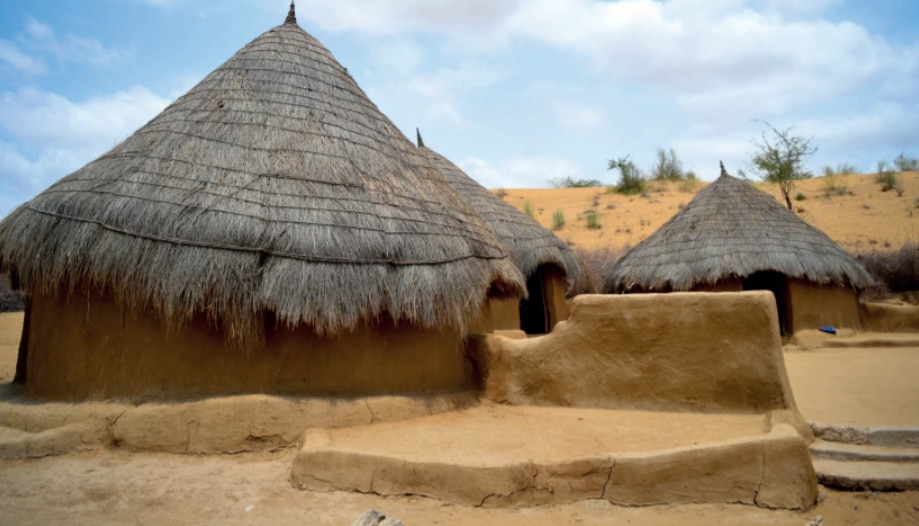
“The task of tabligh that was carried out in the Hindu areas of Sindh was a very difficult task,” and while the Christian missionaries were making efforts to incline those Hindus towards Christianity, Waqf-e-Jadid played a great role in preaching the message of Islam to them. “It was a great task that was carried out by Waqf-e-Jadid in that era and continues to do so. Anyhow, Allah the Almighty granted enormous help and after the efforts of many years, Ahmadiyyat was established in that area. […]
“In 1985, Hazrat Khalifatul Masih IVrh expanded the scheme of Waqf-e-Jadid, the scheme of financial sacrifices, to the whole world, so that the system of Waqf-e-Jadid could also be improved in India and the tasks of tarbiyat and tabligh could be accomplished as much as possible, through the chandas of those Ahmadis who are living around the world, particularly in Europe and America, etc. Thus, tabligh was carried out in those areas where the Shuddhi Movement was initiated [by Arya Samaj] at a certain time during the era of Khilafat-e-Thaniya, and to eradicate its impact, the Jamaat had made great efforts and sacrifices. Hazrat Khalifatul Masih IVrh had stated that the situation in that area was getting worse once again and thus the jamaats in India needed to pay attention to this and make vast plans. Moreover, concerning the expenses, he said that the amount would be raised from the outside [jamaats].
“Hence, as I have said earlier, the scheme of Waqf-e-Jadid was launched in the outside jamaats as well, so that they may also help the jamaats of India in this righteous act. Thereafter, by the grace of Allah the Almighty, the outside jamaats also said labbaik to this scheme of financial sacrifices, and by the grace of Allah the Almighty, the chanda of Waqf-e-Jadid is also increasing with each passing year, just like the other chandas. With the passage of time, while Allah the Almighty is granting expansion to the tasks – the work is increasing and expenses are also increasing – He is providing the means as well. However, as we are aware, the Jamaat is leaping forward with great pace and for this reason, the needs are also swiftly increasing. As I have mentioned, Allah the Almighty is showering His grace [and] the needs are being fulfilled; however, we are also required to pay attention towards this so that we may become the recipient of Allah the Almighty’s blessings by partaking in these financial sacrifices.” (Khutbat-e-Masroor, Vol. 5, pp. 7-10)
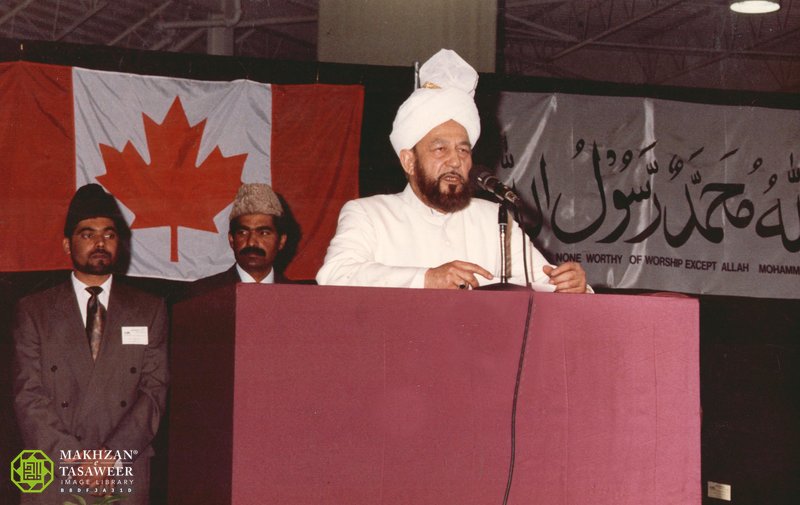
Mentioning the completion of Waqf-e-Jadid’s 50 years, during his Friday Sermon on 4 January 2008, Huzooraa said:
“Hazrat Khalifatul Masih IIra — whose Khilafat spanned 52 years — consolidated the system of the Jamaat and organised it. He initiated various tarbiyati, tablighi, spiritual and financial programmes so that we swiftly leap forward to achieve the objective of the Promised Messiah’sas advent. Waqf-e-Jadid was also a scheme for those tablighi and tarbiyati programmes, which he put forward before the Jamaat, and asked them to offer financial sacrifices and to come forward as life-devotee mu‘allimeen. The aim was to propagate the message of the Promised Messiahas at a greater pace in the rural areas of the Indo-Pak Subcontinent, mostly in Pakistan. He launched it on 27 December 1957, meaning that this scheme has completed its 50 years, and the 51st year has begun. […]
“Hazrat Khalifatul Masih IIIrh had advised the Pakistani Ahmadi children to bear the burden of Waqf-e-Jadid and to tell their elders that once the Ahmadi children are determined, they can prove helpful in bringing about great revolutions. Thus, Ahmadi boys and girls made efforts to surpass each other in offering financial sacrifices, in obedience to the announcement made by Hazrat Khalifatul Masih IIIrh and the task that he had given to the children. As a result, the chanda Waqf-e-Jadid became a recognition of the Ahmadi boys and girls by the name ‘Chanda Atfal wa Nasirat’. The children normally do not have any income; they pay their chanda from the money which they receive from any elder, or some parents pay on their behalf as well. […]
“Such children who make a habit of financial sacrifices from their childhood become a guarantee of their future generations’ sacrifices. May Allah continue to enhance this spirit among our children and now that the scheme of Waqf-e-Jadid is established all around the world, the children, parents, and Secretaries of Waqf-e-Jadid should pay special attention to this. The system of the Jamaat and the auxiliaries of Nasirat and Atfal should also pay attention to including children in the chanda of Waqf-e-Jadid as much as possible. They are required to tell the children about its importance and instil in them a passion for sacrifice. Those children who will be ready to offer sacrifices in this materialistic era and grow while offering sacrifices in this way will not only become the beneficial persons of this Jamaat but rather guarantee a bright future for themselves as well.” (Khutbat-e-Masroor, Vol. 6, pp. 3-5)
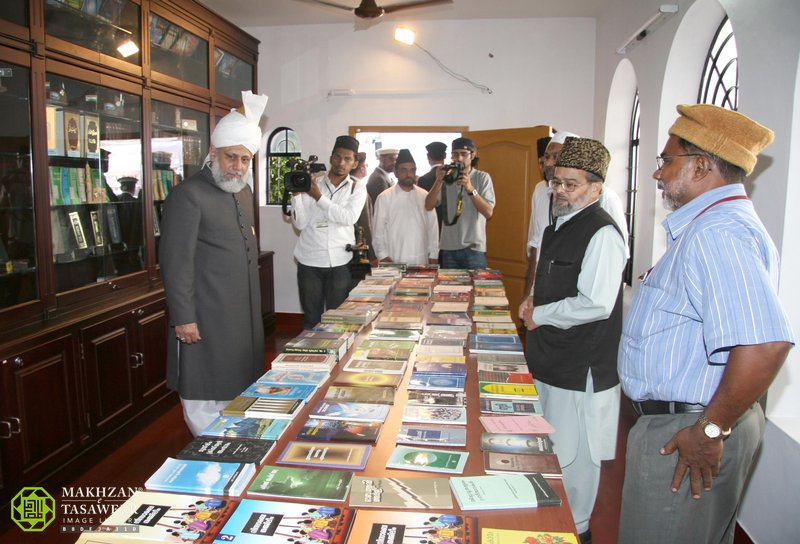
Mentioning the historical significance of Waqf-e-Jadid, Huzooraa said:
“This scheme of Waqf-e-Jadid is also that last scheme of Hazrat Khalifatul Masih IIra in which he gave a programme for tablighi, tarbiyati and financial sacrifices, and as I have said, it has completed its 50 years and is entering into the 51st year. Moreover, it is that special scheme of Khilafat’s first century whose new year is announced by presenting a summarised report at the end of the year. [The new years of] Waqf-e-Jadid and Tahrik-e-Jadid are formally announced; however, there are other schemes as well, but their new years are not announced formally. […] The last year of Khilafat’s first century is concluding with the announcement of [the new year of] this heavenly scheme. Waqf-e-Jadid holds particular significance from this aspect as well.” (Ibid., p. 7)
Mentioning the progress of Waqf-e-Jadid during the year 2007, Huzooraa said:
“The total amount of financial sacrifices in Waqf-e-Jadid is £2,427,000, and this collection is an increase of around £200,000 as compared to the previous year.” (Ibid., p. 9)
Addressing the Ahmadis living in Europe and America during his Friday Sermon on 9 January 2009, Huzooraa said:
“The Waqf-e-Jadid chandas of the rich countries from Europe and America are spent on the mosques, mission houses, literature, and other Jamaat expenses in India and African countries. Thus, [the Ahmadis of] these countries are required to make efforts to increase the amount [of Waqf-e-Jadid] as well, and the increase in participants is obviously essential. I had called the attention of Nasirat and Atfal. […] It is a pleasing fact that by the grace of Allah the Almighty, the spirit of financial sacrifices is being instilled in future generations or young children.” (Khutbat-e-Masroor, Vol. 7, p. 21)
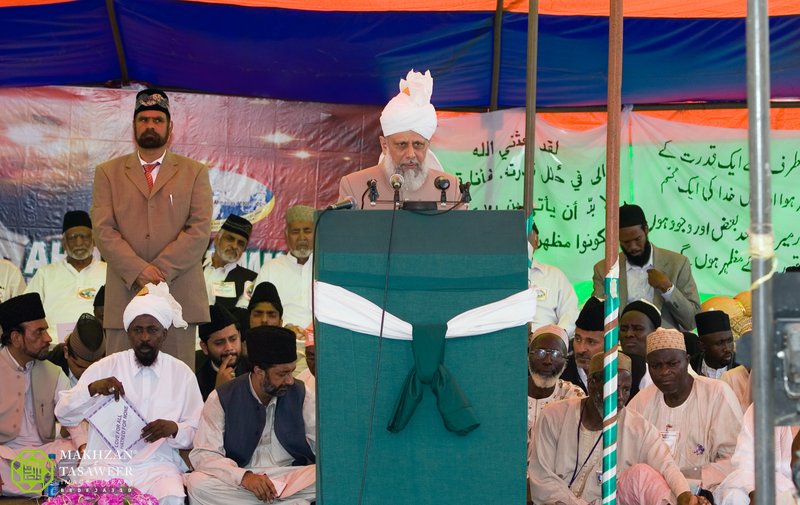
During his Friday Sermon on 8 January 2010, Huzooraa said:
“By the grace of Allah the Almighty, [Jamaat’s] tablighi programmes have expanded to a great extent, due to [the members’] passionate participation in Waqf-e-Jadid. Tahrik-e-Jadid has already been fulfilling its duties. Due to the scheme of Waqf-e-Jadid, the chandas of Waqf-e-Jadid from the countries of Europe and America are playing a great role in the progress of our tasks in Africa, particularly, and in India as well.
“No one should ever assume that the Ahmadis of those [African] countries are probably not making sacrifices in this scheme. Just like in other countries, there is a spirit of sacrifice among the [members of the] Jamaat in the African countries, and it is continuing to grow by the grace of Allah the Almighty. […] In the same way, there are the jamaats in India as well. They have paid great attention to financial sacrifices during the last one to two years. May Allah the Almighty enhance the level of their sacrifices [amin].” (Khutbat-e-Masroor, Vol. 8, pp. 21-22)
Huzooraa further said:
“During the 52nd year of Waqf-e-Jadid, by the grace of Allah the Almighty, the Jamaat has offered a sacrifice of £3,521,000, alhamdulillah, which is an increase of £345,000 compared with the previous year.” (Ibid., p. 25)
Mentioning the purpose and expenditure of the Waqf-e-Jadid chanda, during his Friday Sermon on 7 January 2011, Huzooraa said:
“The chanda of Waqf-e-Jadid – which was initially considered for the Ahmadis of Pakistan alone, meaning only Pakistani Ahmadis would participate in this sacrifice – was then expanded to the whole world during the Fourth Khilafat. The major objective behind collecting chanda Waqf-e-Jadid from the [Ahmadis of] rich countries, meaning the Western and developed countries, was to exclusively spend this amount in India and some African countries to fulfil their needs, where the expenses are increasing and the majority of those jamaats are nau mubai‘een — who are not yet fully acquainted with the financial system [of the Jamaat]. There are mosques being built and other expenses as well. However, you have just listened to some incidents in which I have narrated how those nau mubai‘een are themselves enhancing their level of sacrifices, and through their increasing sacrifices, the needs there are being fulfilled to some extent, but at the same time, new missions are also being established. Thus, the chanda of Waqf-e-Jadid which is collected from the rich or the Western countries will be spent on other new projects where the needs are continuing to increase — mosques are being built, mission houses are being established and literature is being published. These sacrifices that are being made by the Ahmadis of Western countries are, on the one hand, helping them push forward the Jamaati projects in their country and expanding various other tasks; on the other, they are playing a great role in the progress of Ahmadiyyat in these poor countries as well. Thus, in this way, the sacrifices of [the Ahmadis of] these rich countries – including those who are individually making smaller sacrifices — are producing great results just like heavy rain. May Allah the Almighty always accept it, [amin].” (Khutbat-e-Masroor, Vol. 9, p. 10)
During his Friday Sermon on 6 January 2012, Huzooraa mentioned the collection of Waqf-e-Jadid chanda during the year 2011 and said that, according to the reports, the total collection is more than £4,693,000, which is an increase of £510,000 as compared to the previous year’s collection.
Huzooraa also mentioned the increase in participants and further advised the members to pay special attention to increasing the number of participants and to include the nau mubai’een as well. (Khutbat-e-Masroor, Vol. 10, pp. 12-13)
Mentioning the progress of Waqf-e-Jadid during the year 2012, during his Friday Sermon on 4 January 2013, Huzooraa said:
“During this year, attention was drawn towards increasing the number of participants as well. By the grace of Allah the Almighty, the African countries have paid special attention to it.” (Khutbat-e-Masroor, Vol. 11, p. 13)
Huzooraa emphasised:
“The main point is to increase the number of participants so that they may enhance their faith and certainty because this financial sacrifice is also a very essential part of faith.” (Ibid.)
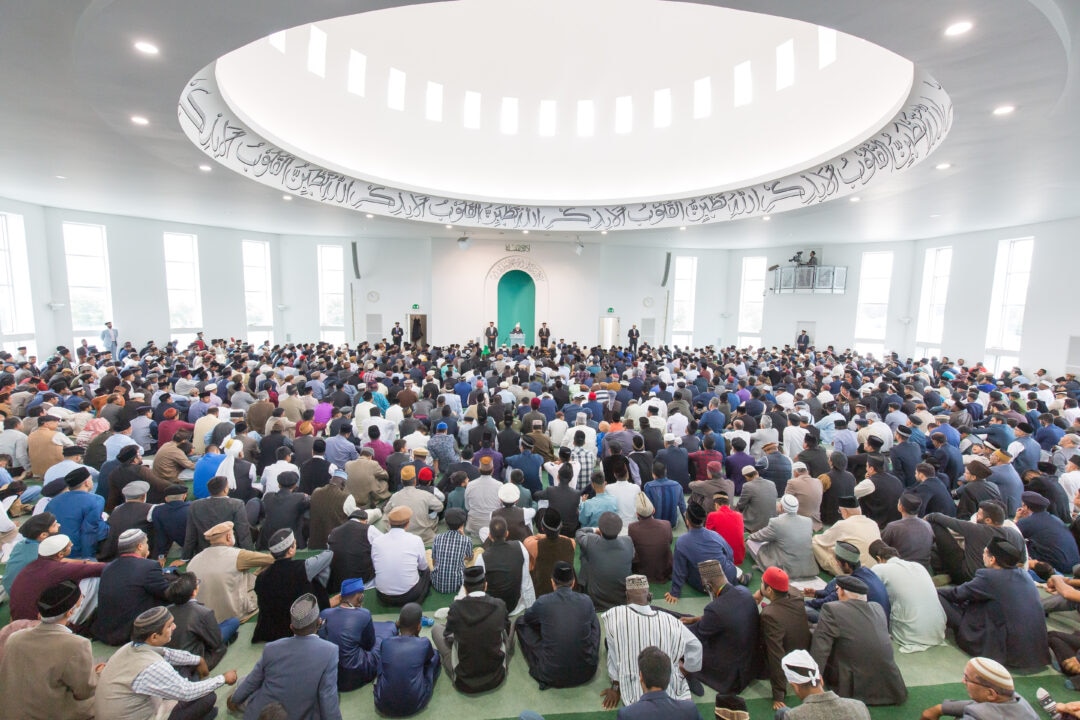
Then, during his Friday Sermon on 3 January 2014, Huzooraa mentioned the services rendered by the Waqf-e-Jadid scheme in Africa and India and added:
“During the previous year [2013], mosques and mission houses have been built in Africa and India, and some have been bought as well. In addition, there are tablighi activities as well, through which Allah the Almighty has enabled hundreds of thousands of pious souls to join the fold of Ahmadiyyat — the true Islam, by the grace of Allah the Almighty. No doubt, the Ahmadis of those countries are also offering unprecedented sacrifices according to their capacity; however, due to poverty, they cannot make as many sacrifices as needed to fulfil all of their [Jamaati] expenses. For this reason, the chanda Waqf-e-Jadid collected from rich countries is particularly spent in Africa and India. However, as I have said, the people of those countries also offer chandas with great passion.” (Khutbat-e-Masroor, Vol. 12, p. 11)
Mentioning the works being carried out in Africa and India under the Waqf-e-Jadid scheme, during his Friday Sermon on 9 January 2015, Huzooraa said:
“By the grace of Allah the Almighty, there are 95 mosques under construction in 18 African countries, and some very vast mosques are being built as well because the number [of Ahmadis] is also increasing there and new avenues for tabligh are opening up as well. […]
“In addition to Africa, such works are being carried out in other parts of the world as well. At this time, there are 25 countries, including seven other [non-African] countries as well, where 204 new mosques have been built during this year [2014]. Similarly, 184 mission houses have been established. Around 80% of the chanda Waqf-e-Jadid from Europe and Western countries is spent in Africa. Despite the fact that African Ahmadis offer great financial sacrifices by the grace of Allah the Almighty, however — due to their needs and the fact that the numbers of bai‘at are increasing and nau mubai‘een are poor — they are unable to fulfil their expenses. They certainly require assistance.” (Khutbat-e-Masroor, Vol. 13, p. 30)
During his Friday Sermon on 8 January 2016, mentioning the system of the Jamaat’s chandajat, Huzooraa said:
“Two schemes are permanent schemes, meaning ‘Tahrik-e-Jadid’ and ‘Waqf-e-Jadid’. The scheme of Waqf-e-Jadid was initially limited to Pakistan only, but then it was expanded all over the world. […] As the members of the Jamaat are aware, when this scheme was launched in Pakistan, it was established to speed up the tarbiyati and tablighi work in rural and remote areas. […] Thereafter, when it was expanded to the whole world, it had specific objectives. Its income was to be spent in certain areas. The areas that were set for it, or the scheme that was initially launched, were for India, and it was later spread to enhance the tarbiyat and tabligh work in African countries and other poorer countries. […] The expenditure of Waqf-e-Jadid is dedicated to specific countries and areas. The chanda of Waqf-e-Jadid that is collected from Western and rich countries is usually spent in the rural areas of India and Africa. In fact, when Hazrat Khalifatul Masih IVrh expanded this scheme to the whole world, the objective behind establishing Waqf-e-Jadid in rich countries was that the expenses incurred by India and Qadian should be met from Waqf-e-Jadid. […] Anyhow, several projects are being accomplished in poor or underdeveloped countries through Waqf-e-Jadid.”
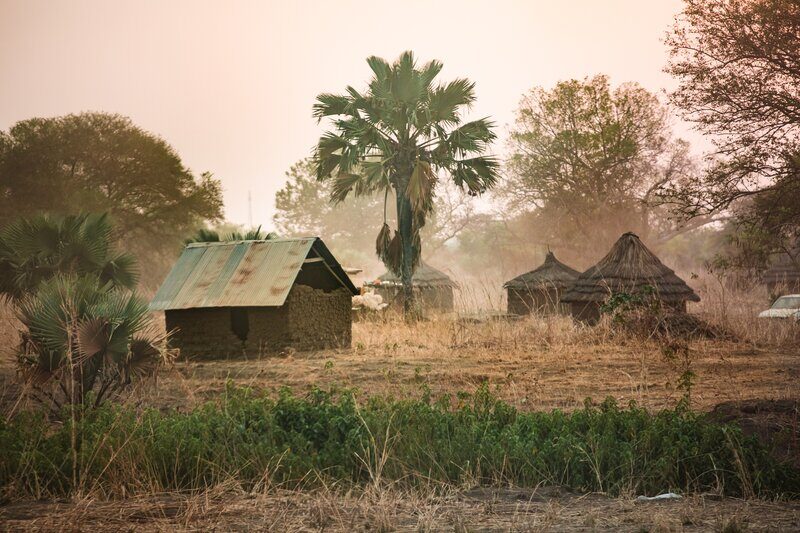
Huzooraa mentioned that during the 58th year of Waqf-e-Jadid, members of the Jamaat were able to offer a financial sacrifice of £6,891,000, which was an increase of £682,155 as compared to last year.
Huzooraa further mentioned that during the year 2015, 130 mosques were completed in Africa and 47 mosques were under construction. In 18 African countries, the construction of 82 mission houses was completed, and 21 mission houses were under construction in 13 countries, and there were more construction projects as well.
Moreover, Huzooraa once again called the attention of Ahmadis towards increasing the number of Waqf-e-Jadid’s participants. (Friday Sermon, 8 January 2016, www.alislam.org)
During his Friday Sermon on 5 January 2018, Huzooraa mentioned that during the 60th year of Waqf-e-Jadid, members of the Jamaat were able to offer a financial sacrifice of £8,862,000, which was an increase of £842,000 as compared to last year. (Friday Sermon, 5 January 2018, www.alislam.org)
During his Friday Sermon on 4 January 2019, Huzooraa said that during the 61st year of Waqf-e-Jadid, members of the Jamaat were able to make a total sacrifice of £9.134 million, which was an increase of £271,000 as compared to the previous year. (Friday Sermon: “Financial Sacrifice – Waqf-e-Jadid 2019”, www.alhakam.org)
On 3 January 2020, during his Friday Sermon, Huzooraa mentioned that despite the worsening economic conditions of the world and severe opposition from the opponents of Ahmadiyyat, the Ahmadis have not decreased their level of sacrifice. (Friday Sermon: “Financial Sacrifice – Waqf-e-Jadid 2020”, www.alhakam.org)
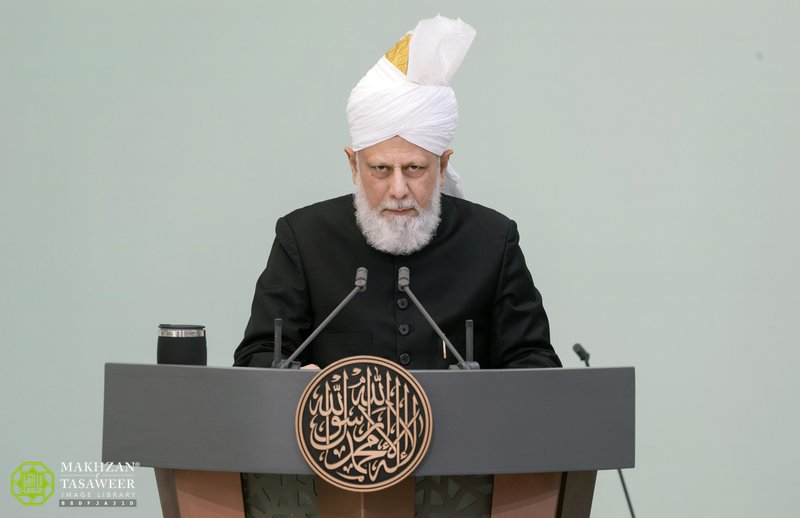
During his Friday Sermon on 8 January 2021, Huzooraa said:
“By the grace of Allah the Almighty, the 63rd year [of Waqf-e-Jadid] came to an end on 31 December 2020 and the 64th year commenced on 1 January [2021]. By the grace of Allah the Almighty, during the previous year, the Jamaat was able to present a sacrifice of £10.53 million, which is £887,000 more than the previous year’s total collection. Alhamdulillah! This cannot be the result of any human effort; rather, it is purely owing to the grace of Allah the Almighty.” (Friday Sermon: “Spending in the way of Allah: Waqf-e-Jadid 2021”, www.alhakam.org)
During his Friday Sermon on 7 January 2022, Huzooraa said:
“In this age, the task of spreading the teachings of Islam and conveying its message has been entrusted to the Promised Messiahas and it is also the duty of his followers to sacrifice their lives, wealth and time in order to complete the mission of the Promised Messiahas. Prophets of every age and every nation encouraged their followers to offer financial sacrifices and the Promised Messiahas has also stated that one should sacrifice a portion of one’s wealth for the sake of serving religion; it is through this that one can gauge the sincerity of one’s faith.
“Believers most certainly make financial sacrifices for the sake of their religion; however, the objective of their sacrifices is not to render a favour upon someone; rather, they merely desire that their Lord be pleased with them and that they are granted steadfastness and that their faith and conviction are strengthened. Also, they desire for their nation to prosper, to strengthen the weak through their wealth as much as possible and to fulfil the purpose of having pledged allegiance to the Imam of this age, who is the true Servant of the Holy Prophetsa. […]
“Today, while the world is engulfed by material desires, these people are sacrificing their material wealth in order to surpass one another in the pursuit of attaining the pleasure of Allah the Almighty. This is because they have understood that one way to attain the pleasure of Allah is by spending in His cause.
“Today, no one can claim that the community established by the Promised Messiahas in fulfilment of divine promises, is weakening. This community was established to spread, thrive and flourish, and no enemy attack can harm it in the slightest. By the grace of Allah the Almighty, this Jamaat is flourishing. I am speaking about financial sacrifices, and in this regard, I will mention incidents about how people demonstrate their conviction in faith by sacrificing their wealth and how Allah the Almighty further strengthens their faith.” (Friday Sermon: “Spending in the Way of Allah; Waqf-e-Jadid 2022”, www.alhakam.org)
After this, Huzooraa narrated various faith-inspiring incidents that depict the passion that is instilled in the members of Jamaat-e-Ahmadiyya to offer financial sacrifices selflessly for the propagation of Islam and to help people in need around the world. (Ibid.)
Huzooraa continued:
“I have mentioned the spread of Islam and spoken regarding expenditures, and so at this point, I would like to mention that over the course of the past year, Allah the Almighty has enabled the Jamaat to build 187 mosques, and there are 105 more mosques which are currently under construction in Africa. Similarly, 144 mission houses were established, most of which are in Africa, while 45 mission houses are currently under construction. Aside from this, where it is not possible to immediately build mission houses, jamaats lease properties; 731 mission houses and missionary houses are being leased in Africa, while 632 mission houses have been leased in other Asian countries.
“I would also like to mention that generally, most of the funds collected under Waqf-e-Jadid are spent in countries of Africa. As for the building of mosques, this is not an easy task, as we face opposition from opponents everywhere. However, the Jamaat is undertaking all of these tasks for the sake of Allah the Almighty, and Allah the Almighty has promised the success of this Community, which is why He continuously provides His support.” (Ibid.)
During his Friday Sermon on 6 January 2023, Huzooraa said:
“Today’s sermon, i.e., the first Friday Sermon of January, is usually regarding the announcement for the New Year of Waqf-e-Jadid. In 1957, Hazrat Musleh-e-Maudra initiated this scheme for the tarbiyat [moral training] and tabligh [propagating the faith] in rural areas. Initially, the scheme was limited to Pakistan alone, but in the era of Hazrat Khalifatul Masih IVrh, it was expanded to cover the entire world. Hazrat Khalifatul Masih IVrh instructed that, out of this scheme, the money collected from the developed countries ought to be spent in [countries across] Africa and other developing countries around the world for the purpose of tabligh and tarbiyat, and this has been the general principle even up until now. The money collected from this scheme is spent in Africa and other poorer countries.
“By the grace of Allah, the members of the Jamaat strive to their utmost in order to be a part of this scheme. However, it is not the case that Ahmadis residing in Africa or other developing or developed nations are not striving to become a part of this scheme. Based upon their income and circumstances, their sacrifices are worthy of praise, but as it were, the extra expenditures are fulfilled from the alms collected in more developed countries.” (Friday Sermon: “Spending in the way of Allah: Waqf-e-Jadid 2023”, www.alhakam.org)
Huzooraa further mentioned that during the 65th year of Waqf-e-Jadid, the total sacrifice offered by the Jamaat was £12,215,000. “Despite the fact that the economic situation of the world has not improved, this is an increase of £928,000 from last year, alhamdulillah.” (Ibid.)
In short, the seed of Waqf-e-Jadid which was sown by Hazrat Musleh-e-Maudra in 1957, is continuing to flourish under the blessed leadership of Hazrat Khalifatul Masih Vaa, and will continue to do so, insha-Allah.

